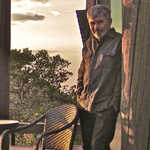

...the dreamers of the day are dangerous men, for they may act their dreams with open eyes, to make it possible.
February 20th, 2014, 4pm
I discovered a copy of T.E. Lawrence’s Seven Pillars of Wisdom on a low shelf in the bookstore across the street. It’s a wonderful read - an autobiography with all the lyricism and depth of a great novel - and one that conveys the grandeur of history and adventure on nearly every page. A triumph, indeed.
Chronicling Lawrence’s exploits during the Arab Revolt in 1917-18, there is much to learn here about the historical record, but also the substantial myth-making that turned a shy, Oxford scholar into the impressive “Lawrence of Arabia.”
Finding the book this time, though, I was reminded of something else.
It was a taxing process for a man working through the trauma of war, and when the original manuscript was left in a briefcase on the platform of a British train station and lost forever, he almost abandoned it.
Thankfully, with the encouragement of friends, he re-wrote the tome from memory, in the end adding somewhere near 100,000 words. He edited three or four more editions during the following years, each new version different enough from the previous that all are coveted individually by collectors the world over. How is it that a man who had completed what Churchill praised as one of “the greatest books ever written in the English language,” felt the need to return to it time and again?
Agility - both emotionally and professionally - has become essential to success in the modern world. Perhaps, though, in art it represents an opportunity lost. Lawrence was (quite literally) of a different time. He was dedicated to the idea of creating a major literary work and knew that commitment and refinement to that single idea were essential skills worth cultivating over time. It makes me consider how lonely (though that may not be the right word) he must have been to live in a world where after being told he had created a masterpiece, he could see only the failings of its composition.
I am reminded of another poet, a contemporary figure also well-known for his constant revisions. In a 1988 interview after the release of I’m Your Man, an album generally regarded as one of the greatest ever made, Leonard Cohen spoke succinctly on why his work is never done.
He said simply, “I can’t discard a verse until I’ve written it as carefully as the one I would keep.”
Other moments in New York
-
Espressoing
in New York, United States -
A few more days
in New York, United States -
Goodbye
A final Hi meeting
in New York, United States -
meditation, Creativity
The local neighborhood bar has a quiet time between six and nine. It is a place that specializes in coffee, beer and seasonal menus. There is just enough of each for a satisfying snack and effective buzz. After the time when the laptop lids close and before the social gatherings start -- there is a sort of twilight*. Often this time is a fugitive ground rife with creative inspiration and meditative work -- of the kind that results in personal reward.*twilight may refer to civil, nautical or astronomical variety depending on your social or terrestrial condition
in New York, United States -
Web, development
A man positions his mouse on the edge of his browser window. He clicks, holds and drags the viewport first left then right. The content of a video game promo micro site responds and adapts to the available space. To the man, this is more delightful than the game itself.
in New York, United States -
subway, music
A man laboriously moves his piano down three levels onto the subway platform. Classic vocals and strided chords -- he played so well I swore he was blind. Oblivious to the heat on that August stage, he was most in touch with his audience -- whom he elevated with his music.
in New York, United States -
Feminism
A woman should do exactly as she pleases no matter what a man may think.
in New York, United States -
Travel
As the Dalai Lama once said, "It is a time when there is much in the window, but nothing in the room."
in New York, United States -
stars, Grandma, Love
"No one understands me," she said. Her grandmother was silent for a minute. It seemed she was searching for an answer in the star speckled sky. "But no one understands anyone in this world, darling. We are all unique. It is what gives us a sense of wonder."
in New York, United States














